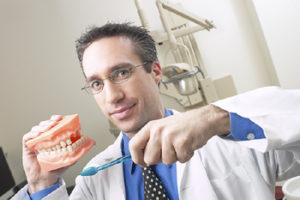Understanding Dentures and Caring for Them

Dentures are artificial teeth placed in the mouth when natural teeth are missing. They restore the aesthetic appearance of the face and functionality of the missing teeth. Helping people go back to their earlier way of consuming food and drinks is the primary purpose of dentures. Besides this, they also help the person get back their self-confidence during social situations.
People who have lost teeth due to accidents, diseases, trauma or aging will tell you that losing teeth have changed their appearance and life drastically. Speech will be affected, words do not come our right and others have difficulty in what is being said. Teeth also provide structure to the face. Face sags when teeth are lost. Dentures can significantly restore and improve the facial appearance.
What are the different types of dentures?
Dentures are made of different materials and are custom made to suit the different needs of each individual patient.
The base of the denture is usually made of acrylic and they are similar in colour to the gums and they blend well. The teeth are usually made of acrylic or porcelain. Porcelain mimics the natural teeth and is generally preferred. They are also very hard and last long, but can be prone to chipping. The frame for the dentures are made of strong materials like chrome or metal and they can withstand the pressure from chewing.
Almost all dentures are custom made and custom made according to each person’s lifestyle. The type of denture is chosen after the dental consultation. Various types of dentures are available depending on specific requirements.
Complete dentures
Complete dentures also called full dentures. Both the lower and upper jaw teeth are replaced. When all the teeth need to be replaced, full dentures are the preferred choice. The material for the teeth is decided after consultation. Adhesives are used to keep the dentures in place.
Partial dentures
Partial dentures are used when some teeth – either in the upper or lower jaw – needs to be replaced. They are used to fill the gap caused by missing teeth. Some of the partial dentures can be clipped on and also removed when they are not used.
Temporary dentures
Temporary dentures are used immediately after teeth are removed. They are used while the permanent dentures are being prepared. It helps people to get used to wearing dentures and also carry on with a normal lifestyle when the permanent dentures are being made.
Flexible dentures
There is another type called flexible dentures. They are similar to partial dentures and are made of thermoplastic material like nylon. Many find this type comfortable to wear – especially for those who are new to wearing dentures.
Procedure for placing dentures
Surgery to place dentures is conducted after a thorough dental examination. During this consultation, the health of the gums and supporting bones are examined. For some, dentists will suggest oral surgery to correct the bony ridges that might work against when dentures are placed. Some will need the removal of remaining teeth. If teeth are to be removed, then immediate or temporary dentures are prescribed by the dentist. This will help in speedy healing of the gums and also provide support to the face shape.
While using temporary dentures, people can continue with their normal lifestyle. A mould of the teeth and gum structure is taken to help to create an accurate set of replacement teeth. If it is complete dentures that are recommended by the dentists, this process will take a bit longer. The gums should be healed completed before they are placed. This might take 6 months to a year. Other types of dentures do not need this time frame. Adjusting dentures will be done during follow up visits to the dental clinic.
Caring for dentures
Wearing dentures and getting used to them takes some time. Taking care of dentures is as important as taking care of natural teeth as it affects the health of a person. Dentures will break if they fall – so they must be handled with care. Cleaning them should be done using brushes that are specifically designed for dentures. Brushes should not have hard bristles as they can damage the surface of the dentures. Like natural teeth, they must be brushed every day and cleaned properly after each meal. Food sticking on to the teeth can cause plaque build-up or stains on the teeth.
Dentures should be cleaned with water or mild washing liquid. Toothpastes should be avoided as they can be quite harsh on the dentures. When dentures are not used, especially at night- they should be kept immersed in a glass of water. They should not be left out to dry. Cleaning and caring for dentures should be discussed with the dentist for proper care. Along with cleaning dentures, the mouth should also be cleaned, especially tongue. Bacterial build up can be seen in the mouth and they need to be cleaned gently with mouthwash or lukewarm water after each meal.
If dentures are not fitted properly, many would experience pain and discomfort. Irritation and sores in the mouth are common. If any uneasiness is felt while wearing dentures, then it must be discussed with the dentist. It is important not to bend or repair dentures at home. There are high chances of breaking them. Check with the specialist if you have any discomfort.
Dentures will need to be replaced or adjusted due to wear and tear. It can also happen due to age related changes – the shape of the face changes, jaw bones change shape and dentures can become loose. Dentists will assess these changes during follow up consultations and provide the necessary advice.
